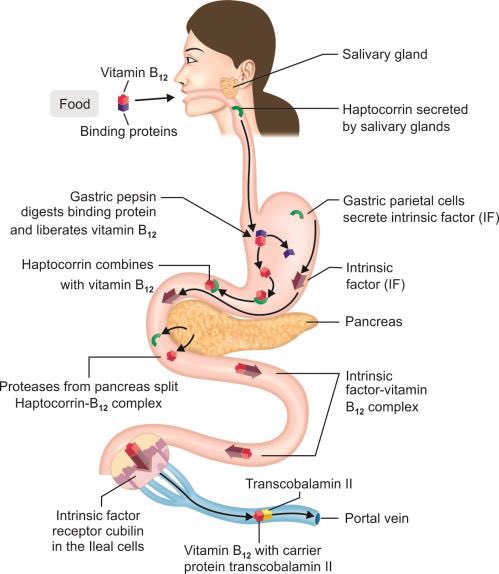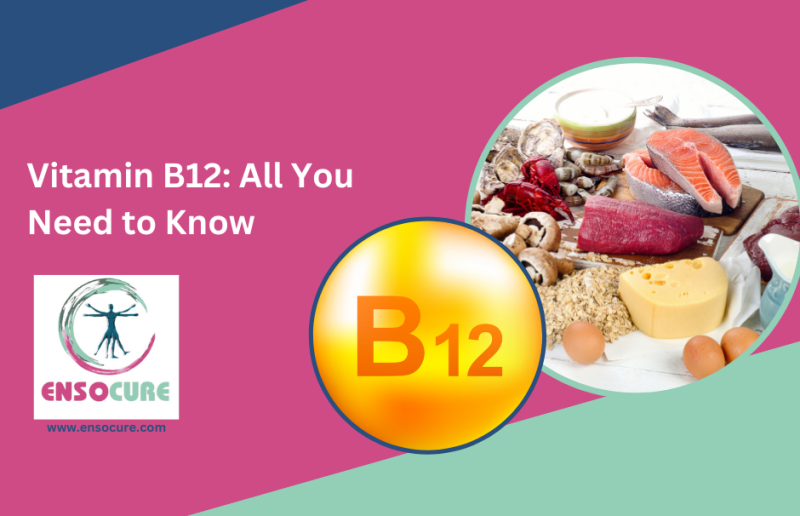Vitamin B12, also known as cobalamin, is a water-soluble vitamin that plays a crucial role in various physiological processes in the body. It is essential for the formation of red blood cells, neurological function, healthy skin, eyes, hair, liver and brain function, brain health. As one of the 8 B vitamins, B12 also helps convert food (carbs) into fuel (glucose) to produce energy as well as helping the body use fats and protein. Vit B12 plays a key role in red blood cell production and the synthesis of DNA.
Vitamin B12 Metabolism

Vitamin B12 contains cobalt which is why it is called a cobalamin. The active natural form of vitamin B12 is Methylcobalamin which is absorbed by the body from the food we eat. There is another synthetic form of Vitamin B12 called cyanocobalamin which is usually in the form of supplements. Cyanocobalamin needs to be synthesized into the active natural methylcobalamin before it can be used.
Vit B12 metabolism is a complex process that primarily occurs in the gastrointestinal tract. When we consume foods containing B12, it binds to a protein called haptocorrin in the stomach which protects B12 from degradation. Once in the small intestine, pancreatic enzymes release B12 from haptocorrin, allowing it to bind with intrinsic factor, a glycoprotein secreted by the parietal cells of the stomach. This makes B12 ready for absorption into the terminal ileum of the small intestine where it then enters the blood stream.
In the blood stream, Vitamin B12 then binds to a protein carrier called transcobalamin II (TC-II) which transports B12 to cells and tissues throughout the body. Once inside the cells, Vit B12 participates in numerous enzymatic reactions vital for energy production, DNA synthesis, and neurological function.
Unlike other water-soluble B-Vitamins, excess B12 is stored in the liver decreasing the likelihood of deficiency. However, in cases in which vitamin B12 cannot be absorbed, for example, due to dietary insufficiency, malabsorption, or lack of intrinsic factor, hepatic stores are depleted, and a B12 deficiency ensues. Some people experience a vit B12 deficiency despite eating food sources of the nutrient, this is because if absorption issues in the body which occur due to various factors including genetics.
Functions of Vitamin B12
- Red Blood Cell Formation: Vit B12 is necessary to produce red blood cells in the bone marrow. Red blood cells are vital for carrying oxygen to various tissues and organs in the body. A lack of B12 leads to reduced RBC production or anemia depleting oxygen circulation in the body.
- Neurological Function: B12 is involved in the maintenance of the nervous system and the production of myelin, a protective sheath that covers nerves. This is important for the proper functioning of the brain and nerve cells.
- DNA Synthesis: Vitamin B12 is required for the synthesis of DNA, the genetic material present in all cells. It is particularly important during periods of rapid cell division, such as in the formation of new cells.
- Energy Metabolism: B12 plays a key role in the metabolism of fatty acids and amino acids, contributing to the production of energy within cells. It helps convert food into glucose, the body’s primary source of energy.
- Regulation of Homocysteine: Vitamins B12, B6, and B9 together regulate levels of homocysteine in the blood. Homocysteine is an amino acid that is broken down by B vitamins into Methionine and Cysteine, both amino acids that work as antioxidants and anti-inflammatories in the body. Excess homocysteine that doesn’t breakdown can damage your arteries leading to a risk of heart diseases, heart attacks and several health conditions like dementia. High homocysteine is a marker of low vit B12 and heart disease. This is why you should never test vit B12 alone, but with homocysteine.
Other benefits of Vit B12
- Liver health
- Prevents Macular degeneration
- Healthy function of brain and nervous system
- Healthy cognitive functioning
- Might prevent congenital abnormalities
Signs Of Vitamin B12 Deficiency
Vitamin B12 deficiency can cause a wide range of symptoms but they can be slow to develop. People can go years not knowing they have a vitamin B12 deficiency until it shows up in a blood test. Symptoms can be subtle or appear gradually intensifying over time. The problem is how deficiency signs can be attributed to other conditions which is why it can be overlooked.
Fatigue and Weakness: Since B12 is involved in energy metabolism, low levels can lead to fatigue and weakness, making everyday tasks feel more challenging. Along with fatigue, one can also experience shortness of breath.
Pale or Jaundiced Skin: Deficiencies in B12 can result in megaloblastic anemia, characterized by pale, or jaundiced (yellowish) skin due to decreased red blood cell production.
Neurological Symptoms: Tingling or numbness in the hands and feet, difficulty walking, memory problems, and cognitive decline are all potential neurological manifestations of B12 deficiency.
Mood Changes: Low B12 levels have been linked to mood disturbances such as depression and anxiety.
Digestive Issues: Some individuals with B12 deficiency may experience digestive symptoms like diarrhea or constipation.
Glossitis and Mouth Ulcers: Inflammation of the tongue (glossitis) and mouth ulcers can occur in individuals deficient in Vitamin B12.
Vision Problems: Blurred or disturbed vision can sometimes be associated with B12 deficiency.
Other symptoms
- Mouth ulcers
- Shortness of breath
- Diarrhea
- Nerve damage
- Inflammed tongue
- Balance problems
- Heart palpitations
It’s important to note that these symptoms can develop gradually and may not be immediately apparent. If you experience any of these signs, especially if they persist or worsen over time, it’s essential to consult with a healthcare professional for proper evaluation and management.
Risk of Vitamin B12 deficiency
Despite being present in foods, some people can acquire a risk of vit b12 deficiency such as:
• Older adults
• Those on restricted vegan diets
• Those with health issues like celiac disease, Crohn’s, and Helicobacter pylori
• People with eating disorders
• People with HIV
• Those on Diabetes medication • Metformin
• Those on Heartburn medication •Proton Pump Inhibitors •H2 receptor agonists
In addition: People with an autoimmune disease called atrophic gastritis might not absorb enough vitamin B12 due to impaired hydrochloric acid production and intrinsic factor in their stomach.
People with pernicious anemia do not make the intrinsic factor needed to absorb vitamin B12. In such cases, high dose supplementation and injections are necessary.
Sources of Vitamin B12
The human body cannot produce vitamin B12 on its own. Instead, it relies on external sources for its supply. Here are some major sources of Vitamin B12
Dietary Sources: Vitamin B12 is primarily found in animal products such as meat, fish, eggs, and dairy products. Fortified foods, such as certain cereals and plant-based milk alternatives, may also contain B12. There are also vegan foods and milks that could be fortified with vitamin b12. Best sources of vitamin B12 include:
- Fish
- Shellfish
- Liver
- Red meat
- Eggs
- Poultry
- Dairy products: Milk, cheese, and yogurt
- Fortified nutritional yeast
- Fortified breakfast cereals
Supplementation: In some cases, individuals may require B12 supplements, especially if they have difficulty absorbing the vitamin from food sources or have certain medical conditions that affect B12 absorption.
Recommended Dose of Vitamin D
According to revised dietary recommendations 2020, The Indian Council of Medical Research recommends a dietary intake of 2.2 mcg of Vitamin B12 for adults and 2.45mcg in pregnancy and lactation, respectively. However, according to the WHO and National Institutes of Health worldwide, the standard recommendation is 2.4 mcg daily. Pregnant people should consume 2.6 mcg, and lactating people 2.8 mcg. That being said, according to research, vit b12 deficiency is a widespread phenomenon in the Indian population considered a silent epidemic in the country.
Excessive intake of vitamin B12 has not shown toxic or harmful qualities. However, DO NOT dose yourself with vitamin B12 without consulting your doctor.

